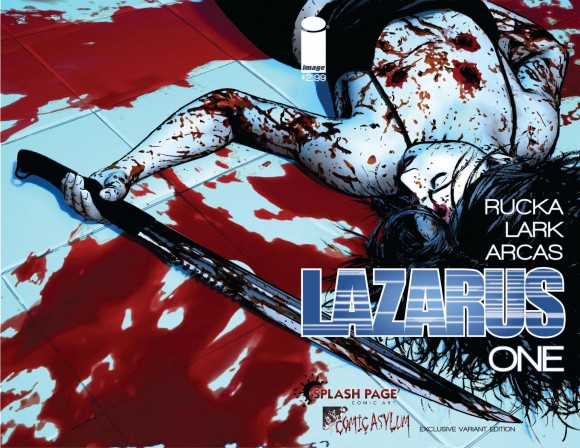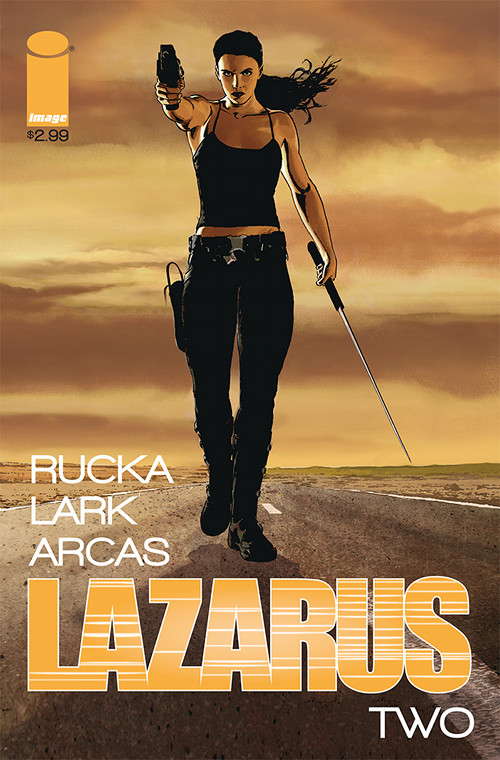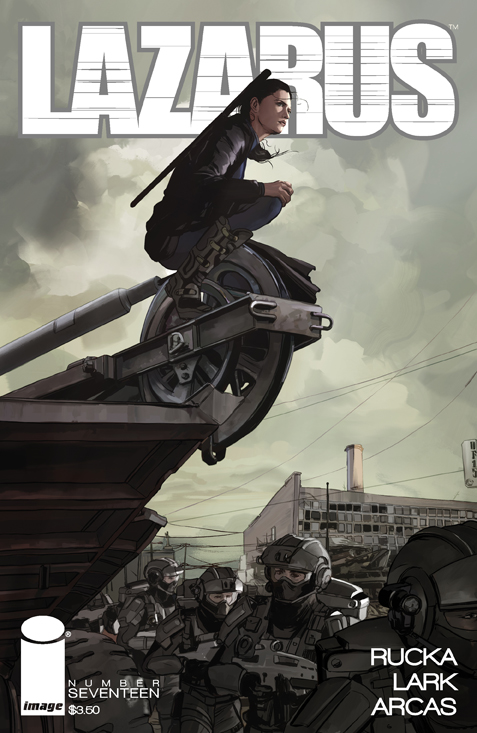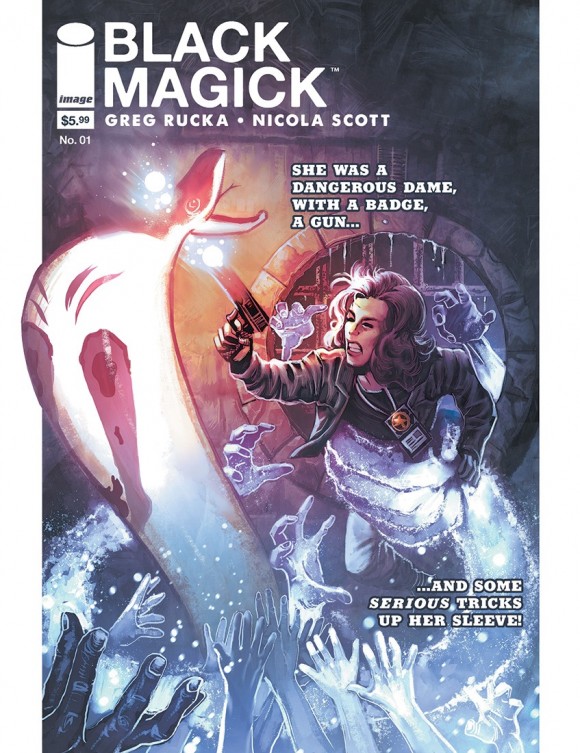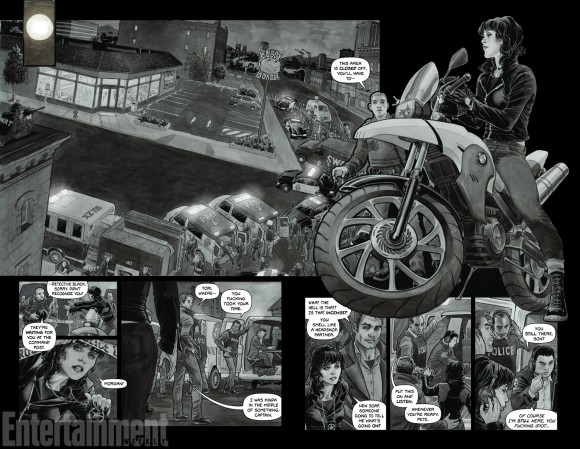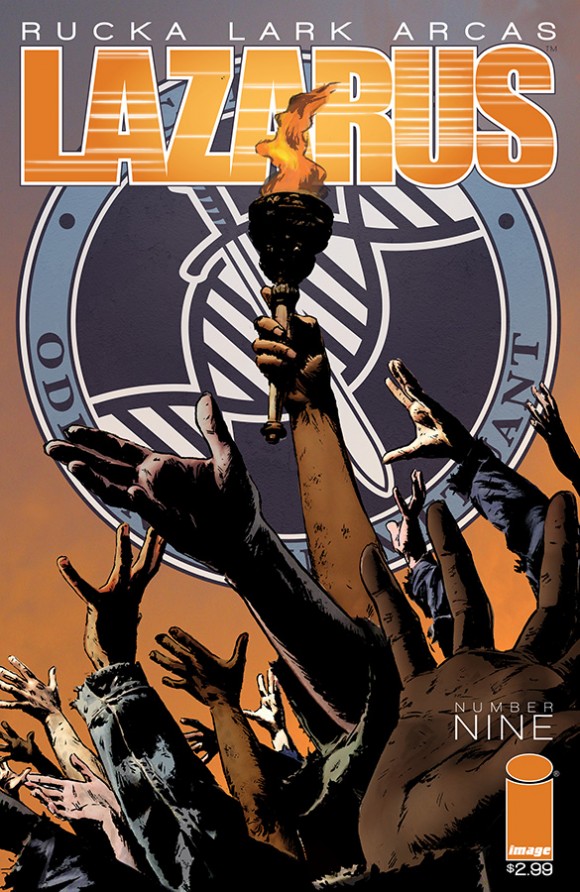In Part 2, Rucka gets into his latest comics work …
By G.D. KENNEDY
During this year’s New York Comic Con, I had the chance to chat with Greg Rucka for a nice long while over breakfast then wandering around the show floor. We talked about his career as a novelist in Part 1 of the interview, and then moved on to his current creator owned works, like Lazarus and Black Magick, both from Image Comics.
The former is a title that Rucka has been working on for a few years with artist Michael Lark, exploring a post-apocalyptic world that, emerging from the ashes, is subject to the oligarchical control of a select few families. The world of Lazarus is strikingly well-rendered, Rucka’s hyperbolic realization of the increasing consolidation of wealth in but just a few hands, and the forces of manipulation and control exerted over the masses to enforce this new world order. Black Magick, in turn, is Rucka’s recent venture with Nicola Scott which launched on Oct. 28; it is noir about a witch who moonlights as a detective, pulled between the strains of her engrained family history and beliefs, and her attempts at a modern life and, in particular, her duties as a police officer.
We chatted over breakfast about the philosophy behind these books and where they are headed, as well as the prospects of the Lazarus television show, which has been in the works for a while now, with Rucka putting the finishing touches on the pilot’s script now.
Below is the Part 2 of 3 of the interview, in which Greg talks about his current creator-owned comics, Lazarus and Black Magick. The final installment, where Greg talks about his Star Wars work and we wander the floor of NYCC, coming soon!
***
G.D: How are things going with Lazarus?
Greg: The books is — it’s a very interesting book to work on. I love it. Mike [Lark] loves it. Image is changing it’s publishing pattern, which is good. We’re not going to be doing any more of this, here’s an issue, six weeks later, here’s an issue.
G.D: They’re putting in requirements that things be somewhat regular?
Greg: Exactly. Which means after we finish the current arc, we are probably going to be on hiatus for four or five months.
G.D.: Give yourself a headstart?
Greg: Yeah. So there’s some things I want to put out in the interim. Once we get the scheduling sorted, I think it will help us. Our floppy numbers aren’t great, but our trade numbers are fine.
G.D.: What are you doing on floppies?
Greg: About 15,000 right now, which isn’t bad. But we are not a cheap book, meaning that we are not a cheap book to produce, but we are a cheap book on the stands relative to almost everything else that Image puts out. We are still $3.50, and we started at $2.99, and almost everything else that people are doing these days are $3.99. We are going to have to revisit that because the book needs to pay for itself. I don’t pay myself for my writing on Lazarus; I take my script fee out of our royalties. I do that because if Lark doesn’t get paid, he’s going 5-6 weeks without a paycheck. If Tyler [Boss, inker] doesn’t get paid, if Santi [Arcas, colors] doesn’t get paid, it’s the same thing. [Eric] Trautman [graphic designer] and Jodi [Wynne, letters]. But for me, I’ve got other things going on. I can wait.
G.D.: Right. Writers can juggle multiple projects, but artists — especially Lark with the detail he puts in — can’t necessarily.
Greg: He would be the first to tell you there is no way he could do anything else. So we are looking at a break point now where I used to be able to pay myself out of the royalties on the floppies and now I have to pay myself out of the royalties on the trades. But, like I said, the trades sell very well and that’s not really surprising given the nature of the book and the nature of the story, and frankly the way the nature of readership has changed.
G.D.: Right. Obviously, trade paperbacks have become such a regular staple. I remember they used to be tied to a unique story — Days of Future Past or something — and now every series gets its own trade, every six issues.
Greg: And they were as easy to find.
G.D.: Lazarus has very clear socio-political commentary. Do you think that is something that is almost too much for people?
Greg: I believe very firmly that the audience is always smarter me, and I believe that nobody wants to read a polemic. I think at this point, Lazarus has pretty much self-selected its audience. People who are not interested in what we’re doing are not going to read it. People who made a decision on what the book was, perhaps without full knowledge, have probably already made the decision. We are finishing our fourth arc. I think we will pick up more readership. I think we will pick up more readership when the television stuff goes through. I think the book is sustainable, and Michael and I have no intention of stopping.
We are going to finish this story one way or another. And that’s not doom and gloom. Fifteen thousand a month is good. It would be nice to have higher numbers. I would happily take Kelly Sue DeConnick numbers. But I think one of the things that– Lazarus isn’t for everyone. Black Magick isn’t for everyone. Stumptown isn’t for everyone. With Stumptown, it’s more of an uphill climb because there are less comic book stores that order Oni. It’s harder to get that book to market, and it’s continuing to be a challenge now because Marvel and DC consistently flood the monthly, and if you’re a retailer, your gamble is on, “What am I going to sell?” There are retailers who never go past the front of the previews catalogue.
G.D.: Which is funny because I live in the neighborhood and Midtown Comics is my local store. So I’m completely spoiled; you lose perspective that everyone can’t just walk into the store and find whatever they want.
Greg: Right. Midtown is not a unique animal, but it is certainly a rare animal to be encountered in the wild. There are — I live in Portland; I’m spoiled as well. I’ve got five different comic book stores and they’re all excellent. Of the stores I frequent, not one of them is bad.
G.D.: How long is the plan for Lazarus?
Greg: Issue 20 just got locked for printing. The arc ends with 21. We have another 80 to 130 issues to print. I plan on going 100 to 150 on this. We are sort of at the end of the first act now, and that was the other — you needed to be patient with Lazarus. You didn’t get everything you needed until the end of the third arc. You had to see the Carlyles and you had meet the Barretts so you can see the structure, and you had to see Conclave, so you can see that this is the world, and this is how the world is changing. Only at that point really had I put all of the pieces in play.
G.D.: I think it was once you saw the Lift, it was one of the first moments that the reader gets the sense of the scale of the story and what’s going on.
Greg: Yeah, yeah. And that it’s ubiquitous and that it’s inescapable.
Black Magick is much more limited. Nicola [Scott, artist] and I — that’s probably going to be about four years, about 30 issues, a little over. We are trying to give ourselves a little room to maneuver. We’ve talked about doing some ancillary stuff that will make stuff once the book starts coming out and people are able to read it. And, again, like Michael, Nicola is like, “I’m doing this all. This is my thing.” Michael, he and I would talk about getting a fill-in, and he was like, “Fuck no. This is my book. I’m doing it.”
G.D.: How involved is Michael in the creative process of Lazarus?
Greg: Very. Very. And the same with Nic. I give them my script, but we discuss the script, and we discuss the story, and where we are going. With Michael, I tend to try and hold things in reserve because I tend to want to surprise him, ’cause he’s hard to surprise, and I love it when he writes or when he calls and says, “Oh my god, I can’t believe . . . .” But that’s about 50/50; there are times when I’m talking to [David] Brothers, and I’ll call Michael and be like, “This is what I’m doing.” The thing about Michael is he’s combative. He’s combative in a very positive way. He challenges you. I’ve met a few artist like this. This is an artist thing, far more more than with writers, where he engages the story and then he will quite bluntly play devil’s advocate and say, “Why?” But he kicks the tires on every idea.
G.D.: Which is good.
Greg: No, it’s great. Like I said, this is joined. He is the co-creator of the book. Nothing annoys me more than seeing “Greg Rucka’s Lazarus,” in the same way that “Greg Rucka’s Black Magick” is not true. And one of the things that I love about comics in general is that it is such a collaborative medium. I can’t draw, man. These things don’t happen unless I’ve got people I can work with.
G.D.: Or it’s nothing but a series of stick figures.
Greg: Exactly. And even then, it’s incomprehensible. These are not people who are taking dictation. I want to work with talented, smart people who are going to bring their talent to it. I want to work with people like Nic and Justin Greenwood and James Lucas Jones, and it goes on and on.
When I first started in the industry, it goes back to that editorial thing, there was an element of you’re delivering dictation, that you gave a script to the editor, and the editor gave it to the artist, and you just saw the final product, and you’d be like, “What the hell?”
G.D.: So, Black Magick, we’ve only seen previews so far. Can you talk a little bit about the story?
Greg: Black Magick’s about a woman named Rowan Black who is the latest generation in a long, long, long, long family legacy of traditional witchcraft. This isn’t Gardenia Wicca, which is a fairly modern reinterpretation of, quote unquote, WASP pagan faith. She can trace a lineage back several thousand years and that, her faith and her belief are in conflict with what she is in the modern world, which is a police detective. And the story is basically what happens when these two things collide, and collide in ways that are very painful.
Rowan is a very flawed character. She makes mistakes. She is at odds with her own faith at times. On a larger level, talking, it’s a question of the individual’s right to free will. What magick is — magick is described as the ability of the individual to exert their will on reality. But if I can do that, then I’m exerting my will on your reality, and is that fair to you?
G.D.: Then it’s an issue of control.
Greg: You got it. And if my will is to make you do something that you do not want to do — so, modern Wicca talks a lot about the ethics of magic, the Threefold Law that the good you do is returned to you, and so is the ill. And thus, you want to be responsible and you want to live responsible. But, again, that’s a modern interpretation, and we can act with the best of intentions and still have ill effects. And sometimes we can want to act with the best of intentions but we’re selfish creatures, we know we are doing things we shouldn’t.
G.D.: How did you come into the idea of doing a story about magick?
Greg: Well, I’ve always dug stories about the occult, and I’ve never gotten to do — in my career thus far, my opportunities to chase it down have been really limited and quite often failures. Veil, which came out from Dark Horse last year, was pretty — it was really the first time I was able to execute. I toyed with it in some of the DC stuff, but I’ve yet to get the feel of the inevitability in a good version of those kind of stories, so that was one element. And I wanted to write cops. I wanted to write a cop again.
There wasn’t a specific thing that happened. It’s weird, I’ve tried to chase down why, but I’m not sure. I can look at Lazarus and say, these things were happening and there you go. Black Magick comes out of a lot more personal place. It comes out of me saying, “I’m not working for DC anymore. I would like to be writing something. Here’s an idea.”
G.D.: It seems like control is a theme in a lot of your work. Lazarus, it’s a huge element. What is the motivation there?
Greg: See, there you go. You just asked — yes, you’re right. I hadn’t thought of that. So there you go. I had not made that connection, but given the nature of the whole conversation, very nice. I don’t know, I think that we use “manipulative,” the descriptive, as a pejorative. It is quite often used in regards to women — “She’s a manipulative bitch” — but one can argue that the nature of manipulation of not in and of itself negative. How it’s used, maybe. And my counter-argument would be, and we have in the first issue of Black Magick a hostage situation, and that is a situation of two people actively trying to manipulate each other. That’s a negotiator trying to manipulate each other. You have a negotiator trying to manipulate the hostage taker into releasing hostages. And then you have the guy who has taken the hostage who is actively trying to get what he wants in exchange.
So, I think that the difference there is what is tacit and what isn’t, and what levels we know we are being manipulated on and what levels we don’t. We’re in flipping Manhattan; you can’t go outside and see things that manipulate you everywhere. Everywhere. And we’re going to be going into the convention hall, and it is going to be literally exponentially increased.
G.D.: You’re going to be directed where to go —
Greg: And what things to buy, what they want you to like. Everything is there. So, I think there is a big part of me — I once heard that people who are aware and have been educated in manipulation and advertising, they are actually the most susceptible. They think they’re not, but it works really well on them. The fact that when you walk into the supermarket, they’re spraying water on the produce and you get a little thundercloud effect — and it’s horrible for the produce — it makes it rot faster and it degrades it faster, but, oh, look, it’s glistening, it must be fresh. And you know that! But the glistening fresh one looks better than the actually fresh healthy one that isn’t soaking wet, so, go figure.
G.D.: The more you see the system, the more it controls you.
Greg: Mmm-hmm. Which is terrifying if you really chase that down. That’s really scary. We are arguably in an election season already, and never is it as bad as when somebody runs for fucking President. This is the bullshit season. Doris Kearns Goodwin was a guest on The Daily Show during Jon Stewart’s last week and she was saying that she wants it to go back to the way it used to be, which was that you had a convention in the summer that the party nominated, and then you have from the summer until November. And that’s what we need.
G.D.: That is ample time.
Greg: Yes. That is what we need. Because this is entirely a plutocratic process. Nobody is running — as much as the pinko liberal in me looks at Bernie Sanders and says, “Go Bernie,” the fact of the matter is that he is a plutocrat candidate. He doesn’t want to be but he’s got to have the archest to run. They have to have the money. And you don’t get the feel of every clown car Republican running, unless there is someone behind him who says, “I’ve got a billion dollars I can dump on this.” And that’s why Scott Walker dropped out. He didn’t drop out for any ideological reason.
—-
So at this point, my recorder cuts off without any notice and we continue talking for the next ten minutes or so, finishing breakfast and beginning the one-avenue trek to the Javitz Center. We end up losing about ten minutes before I realize what happened and restart recording; what follows is a synopsis of the lost minutes.
Greg continues talking about Lazarus. He explains that one of the motivators behind the series is increasing wealth inequality — not necessarily the expanding gap between lower-class and upper-class, but rather the serious divide between the super-wealthy and the rest. It’s not about “the 1%,” he explains, but about the fact that in our world, it is the .0001% who increasingly control the vast majority of wealth. He cites to a series of articles from recent years describing how that the majority of the world’s wealth has been and continues to be consolidated among a small number of families, and the disturbing reality that this number of families at the top has decreased, while the value of global wealth controlled has increased. This is the wool that is pulled over our eyes, he explains; the uber-wealthy individuals are able to hide in plain sight, unknown to the general public but ultimately pulling the economic and political strings as mysterious oligarchs. The misdirection is the fighting between the 1% and the 99%; the real fight is between the .0001% and the rest, and this, he says, is the point that he thought was missed by the Occupy Wall Street movement.
To pull this veil back, Greg explains the necessary complexity of building the world of Lazarus. In many ways, it is subtle, but to make it effective, Greg needs to make it believable. The world of Lazarus may be a fictional end-result of our present circumstances derived from the worst elements of our own socio-political existence. (although I’m not sure Greg would suggest that its farfetched), but it is meant as a cautionary tale, and thus the Lazarus world is not supposed to be fanciful but rather terrifyingly real. To accomplish this, Greg needs to iron out each detail, building something that can function as a real economy based on the conceit of a select few families, each with a monopoly over critical aspects of the human survival — food, fuel, medicine, and so forth. To make this effective, he considers mechanisms like how to maintain a political equilibrium between his ruling families, which ultimately became the Conclave, a meeting between the families designed as a mechanism to resolve disputes short of warfare. A more nuanced element is working out the actual economic system, dealing with things like commodities futures and balancing the value and equity of each resource as the different families engage in trade and commerce. These are small details but necessary to effectuate the world that is being created, and is something that Greg works hard at, and takes pains to ensure is as flawless as possible.
We wrap up breakfast and as we head out, Greg pulls out a pack of cigarettes, while I come to the realization that my recorder has shut off. As I restart the recorder and we leave the restaurant, Greg talks about how the ruling families in Lazarus maintain control over the lower castes: the families are seriously outnumbered but keep their position at the top by offering to the masses the prospect of a better, or at least more stable, tomorrow, specifically through the Lift, a mechanism by which lower caste members can be elevated to a higher station through a selection process designed to weed out the best and brightest, and give them just enough to lose that they would not risk revolution.
Which is where we come back to the interview . . . .
—-
Greg: That story, that narrative is pretty powerful. And what I think Carlyle’s genius is, what I think Malcolm’s genius is, is that if you get lifted, your family comes with you. All of a sudden, the investment’s enormous. And there’s a line in the pilot that’s not actually in the book, Stephen and Jonah are having a conversation, and Jonah has discovered a handbill newspaper that is put out by the free, and he’s kind of appalled, and says, “Why are we allowing this?”, and Malcolm says, “We are allowing it because it allows for an insight, we know what they are thinking. It allows us to monitor.” And Stephen later says, “And half of them we are putting out ourselves.” And Jonah’s like, “Are you fucking kidding me?” And Stephen says, “Look, I found my director of communications through this thing. I found the guy, I tracked him down, and I offered to lift him.” And Jonah says, “But he fucking hates us.” “But he wants to feed he family more.”
G.D.: Right. The greatest control is the illusion of freedom.
Greg: Exactly. And this guy will suck it up, because “I’ve brought my wife, my kids. My kids are going to live a better life: they’re healthy and they’re going to be educated. My parents are now in comfort.” So this guy can be there and be like, “I’m on the inside, I’m going to burn this down, but where am I going to be if I lose all of this?” And you know the punitive result of doing that is that it doesn’t just take him. It takes everybody.
Carlyle soldiers, they’re whole families are lifted, and if they die in the field, their whole families don’t get sent back down.
G.D.: If you give the smart people just enough that they’re comfortable —
Greg: Exactly. People will sacrifice a hell of a lot in the hope that, “Maybe I’ll get lifted. Maybe I’ll be there.” I think that that, inasmuch as I am going to pat myself on the back for anything in Lazarus, I think that as sort of means for Malcolm rebuilding the world made a lot of sense. And we see it all the time. We suck up incredible amounts of bullshit in our daily lives in the hopes that it will get better.
G.D.: Right. In many ways, what is a day job? You give up comfort and freedom to punch numbers, what ever it may be, in the hopes of a secure future.
Greg: For Evil Corp., to borrow a line from Mr. Robot. But that’s exactly it. We are willing to do all of these things — I mean Jesus Christ, we both have iPhones. You’re recording this on an iPhone. The concept of that iWallet, where you put your credit card on your phone and you just tap it. Oh my god, you know what I mean? It’s convenient, but what have we just surrendered there?
I don’t think of myself as terribly clever. I think I’m reasonably observant. So I suppose that, more than anything else, is where Lazarus comes from.
G.D.: What’s going on with the Lazarus television pilot?
Greg: We’re working with the — at this moment, as of today, we have a really good draft. We have notes from Legendary on it. I’m doing the revision. That will be going in early next week, and then once Legendary has approved it and they’ve made they’re final pass and we’ve made all their notes, we’re looking for somebody to buy it.
G.D.: So it’s optioned to Legendary right now?
Greg: Matt Tolmach Productions and Legendary. Legendary television, in fact. So the goal now is to find Hulu or Netflix or FX or somebody who says, “We really like this. Here’s a check. Make a show.” Ideally, I would love to see it on a streaming service. I think that would suit it best. I think that would reward us well. I suspect that — there was a study released where Netflix had crunched their numbers and discovered that it was not the pilot that was hooking people, but it was around, most commonly, the third episode. If you look at the dramatic structure, in most of the series that they’re talking about, that third episode is the end of the first act. And then, you’re seeing people are in and invested and staying for the ride. And for others, it would be after the first season, during the second season, boom!
Ideally, I would love us to do ten episode season. Thirteen I think would be pushing it. Ten would be ideal. One of the things that is really exciting about this is that, we have on average 22 pages per issue. There’s a lot of stuff that we don’t get to explore. And there’s stuff with characters that we haven’t been able to chase down because we don’t have room. And I would love, one of the things I’m most excited about for television, is the ability to chase those things that for lack of a better phrase — and talk about mixing a metaphor — got left on the cutting room floor for the book.
But there are story beads — characters have not been well served. Johanna is finally getting her due, and starting with issue 19, you get to see who she really is.
G.D.: She’s been one of the most compelling characters in the book, I think.
Greg: Right! But if you look at her in the beginning, she’s like, “muhahaha” [witchy cackling]. She’s this twin-cesty thing, and, oh my god, I never should have done that. I had an idea about the way — once power sits, you talk about a feudal system, it stays in the family. The one thing constant about all these families is that every family is terrified about losing what they have. So you’re going to keep it. You’re not going to marry it out, especially if you’re Carlyle. So where are you going?
And that made sense to me and then Game of Thrones made incest vogue, for lack of a better term. It became all the rage. I guarantee you there’s a whole new realm of fetish porn that people never knew they were into. Yeah, as horrifying as that is, you and I both know it’s true.
So one of the things that I’m excited about in the pilot is that you see that the relationships between the siblings is much more complex. You see — you can’t tell when you read “Family” that what Johanna is doing . . . . Jo loves Forever. That has never been evident in the comic.
G.D.: I think it’s started to come through in recent issues.
Greg: Right, but when you see it, it’s always with the question of whether she’s using her. Jo is actually very fond of Forever. There is a moment coming after this arc ends where Forever and Johanna have to have a come-to-Jesus. Because Forever now knows everything that happened. She knows what Jo did. And from where she’s standing, she’s like, “You tried to murder me.” And this is spoilery, but Jo’s response is, “No, I didn’t, because I knew you’d survive. I hurt you and I’m not happy that you got hurt, and that you were hurt horribly by what I did, but that was never about you. It was always about Jonah, and about getting Jonah out of the picture.”

